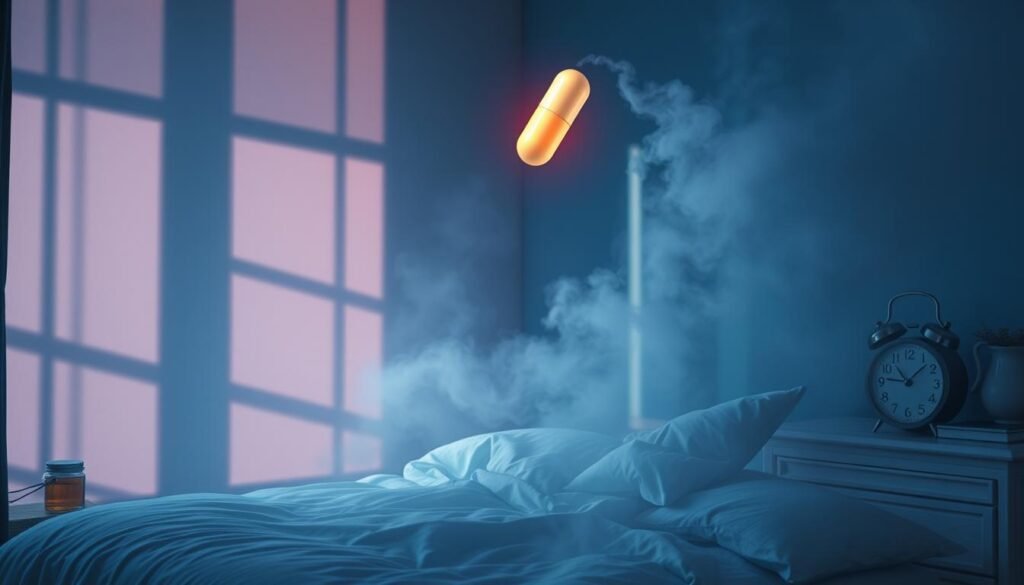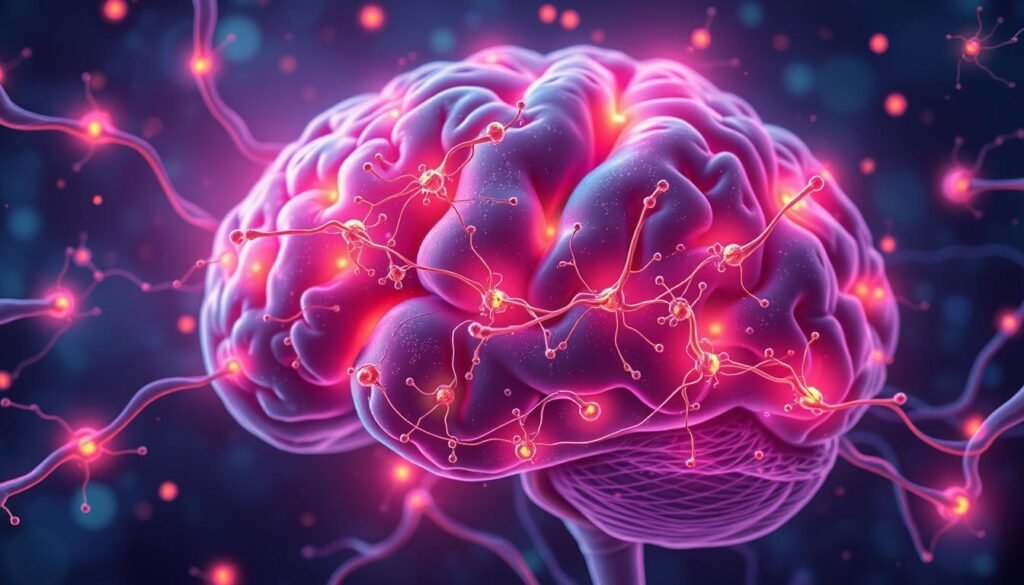In the United States, about 1 in 3 adults struggle with chronic insomnia. This has made many look into different treatment ways. A study with over 211 adults tested the effects of medicines like Ambien on sleep and anxiety. The findings give clues on if Ambien can help ease anxiety as well as improve sleep.
This article digs into how Ambien works, its impact on the brain, and the risks of using it for anxiety disorders. Is Ambien just for better sleep, or can it also treat anxiety? Knowing its role could help people find good options for overcoming their anxiety problems.
If you want to know more about Ambien, including possible dangers and side effects, more info is available here.
Key Takeaways
- Chronic insomnia impacts 1 in 3 U.S. adults.
- Ambien is mainly for sleep issues but its effect on anxiety is being studied.
- Using different treatments together can improve mental health and daily life.
- It’s important to know the risks, like sleep-related actions, when using Ambien.
- Experts often suggest therapy and lifestyle changes over using medication for a long time.
Understanding Ambien and Its Uses
Ambien contains zolpidem tartrate and is mainly used for short-term insomnia treatment. It’s in a drug class called sedative-hypnotics which help calm the brain. This action helps you fall asleep faster and sleep better. People also use Ambien for anxiety-related sleep problems because of its calming effect.
The American Society of Sleep Medicine recommends Ambien for adults who have trouble falling or staying asleep. The Ambien anxiety medication interacts with GABA receptors in the brain, promoting sedation. This is why it’s helpful for those with anxiety that disturbs their sleep.
However, it’s important to remember that Ambien should not be used long-term. Long-term use can lead to dependence and withdrawal symptoms. Always use under a doctor’s care, especially if considering Ambien effects on anxiety.
What is Ambien?
Ambien, also known as zolpidem, is a medicine for treating insomnia. It helps people fall asleep fast and stay asleep all night. It’s valued as a key option for dealing with sleep issues.
Sometimes, doctors give Ambien for Ambien anxiety. This is when anxiety stops someone from sleeping well. Talking to healthcare experts helps figure out if Ambien prescription could help with Ambien for anxiety symptoms.
People with anxiety often find it hard to sleep. It’s important to look at different ways to help, including possibly using Ambien for anxiety-induced sleep problems.

How Ambien Works on the Brain
Understanding how Ambien works can help those with anxiety. This medicine boosts gamma-aminobutyric acid (GABA) in the brain. GABA helps calm the nervous system, which can lower anxiety levels.
Effect on GABA Activity
Ambien increases GABA activity. GABA lowers nerve activity and helps you relax. Studies show Ambien can reduce anxiety, especially in people with insomnia from anxiety. By boosting GABA, Ambien makes starting sleep easier and may reduce anxiety.
Role in Initiating Sleep
Ambien is great for people with anxiety causing sleep problems. It works fast to help with falling asleep. However, keeping sleep through the night might need more attention. Some people have noticed trouble sleeping and more anxiety after stopping Ambien. It’s crucial to use it carefully.

Looking at different anxiety medications like Ambien and Benadryl is beneficial. You can learn more about Benadryl here. With many options available, finding a strategy that works for you is important. It’s also good to think about the risk of becoming dependent and withdrawal symptoms.
| Aspect | Ambien | Benadryl |
|---|---|---|
| Type | Sedative-hypnotic | Antihistamine |
| Primary Use | Insomnia and anxiety-related sleep issues | Allergy relief, with sedative effects |
| Dependency Risk | High | Moderate |
| Onset of Action | Rapid | Varies, generally moderate |
| Side Effects | Dizziness, cognitive impairment | Drowsiness, dry mouth |
Ambien and Anxiety: Does Ambien Help With Anxiety?
Many people with anxiety have trouble sleeping. This can create a hard-to-break cycle. Anxiety makes sleep harder, and lack of sleep increases anxiety. Ambien is now seen as a way to help with these issues.
Connection Between Anxiety and Insomnia
About 40 million adults in the U.S. suffer from anxiety disorders every year. Most of them also have insomnia. This combo can really hurt their wellbeing. Ambien helps by calming the mind and promoting sleep. This is crucial because poor sleep can make life harder.
Short-term Benefits for Anxiety Disorders
In the short run, Ambien benefits for anxiety are quite noticeable. It helps people sleep faster, easing intense anxiety quickly. This is especially good when anxiety hits hard, offering Ambien anxiety relief. But remember, Ambien is mostly for short-term help.

Ambien and Xanax are different in handling anxiety. Xanax is for ongoing anxiety and panic attacks. Ambien focuses on solving sleeping problems. Know these differences and talk to a doctor for advice. Learn more about how they compare here.
Potential Risks of Using Ambien for Anxiety Relief
Ambien is often seen as a quick fix for anxiety. But, it’s not free from serious risks. Those looking for relief from anxiety must know the dangers. Ambien anxiety medication has a risk of abuse and dependence.
Abuse and Dependence Issues
The concern over Ambien abuse potential is big. A 2020 study found about 803,000 adults misused zolpidem products like Ambien. Misuse can happen even if you’ve never abused substances. This is especially true if you take higher doses. Those with a history of addiction in their family are at greater risk. Dependence means needing the drug for sleep and to manage anxiety.
Rebound Insomnia and Withdrawal Symptoms
Stopping Ambien can lead to distressing Ambien withdrawal symptoms. Though rare, affecting less than 1% of users, symptoms can be tough. They include fatigue, nausea, and panic attacks. In extreme cases, seizures can occur. Stopping Ambien suddenly often results in rebound insomnia. This means sleep problems can get even worse than before. This cycle can make anxiety worse or cause new emotional issues. It shows how important it is to be cautious with this medication.
Ambien’s Efficacy Compared to Other Treatments
A closer look at anxiety treatment shows Ambien might not always be the best. People trying to manage anxiety, especially with sleep problems, have a tough time. They are often told to try different things, including behavioral therapy.
Behavioral Therapy vs. Medication
Cognitive-behavioral therapy (CBT) is proven to help with anxiety and sleep issues better. It often works better than just taking medications like Ambien. This means people should really think about their treatment options, especially when considering Ambien or therapy.
Long-term Outcomes of Ambien Use
Ambien helps with sleep problems caused by anxiety in the short term, but it has downsides for long use. Many people suffer from insomnia, and using Ambien too much can cause dependency. Studies show that, in the long run, alternatives might be better than Ambien. It’s important to talk to doctors if thinking about using Ambien for a long time.
| Treatment | Type | Typical Use Duration | Controlled Substance |
|---|---|---|---|
| Ambien | Medication | 7-10 days | Yes |
| Hydroxyzine | Medication | 3-4 months | No |
| Cognitive Behavioral Therapy (CBT) | Therapy | Variable | No |
Choosing between medication and therapy for anxiety relief is a big decision. Talking to trusted sources can help. They give information on alternative treatments for anxiety and ensure choices are well-informed.
Who Should Not Use Ambien?
Knowing who should steer clear of Ambien is key for safe medication use. Some people face big risks with this sleep helper. Look into your health status and drug interactions that could make side effects worse.
Pre-existing Health Conditions
If you have health issues like sleep apnea, serious liver disease, or lung diseases, be cautious. Before taking Ambien, talk to your doctor. The Ambien contraindications also include those who’ve battled substance abuse. These conditions can increase the chances of negative reactions.
Drug Interactions to Consider
Being aware of Ambien interactions helps in getting the right treatment. Ambien doesn’t mix well with drugs like opioids, benzodiazepines, and some antidepressants. Mixing them can make you extra sleepy and bring other risky side effects.
Also, taking Ambien with alcohol, cannabis, or herbal stuff like St. John’s Wort is bad news. It cuts down on how well the medicine works. If you’re on several meds, talk to a doctor about who should avoid Ambien. This conversation helps you know your risks.
| Health Condition | Potential Risks |
|---|---|
| Sleep Apnea | Respiratory depression |
| Liver Disease | Increased side effects due to impaired metabolism |
| Substance Abuse History | Higher likelihood of dependence |
| Allergies to Zolpidem | Severe allergic reactions |
Alternative Treatments for Anxiety Disorders
Anxiety meds like Ambien help short-term. But, there are many other treatments for anxiety. These include different drugs and therapy methods that fit all types of anxiety disorders.
Other Medications
There are many drug options for people with anxiety. Antidepressants such as amitriptyline and mirtazapine can help with anxiety and sleep problems. Benzodiazepines like diazepam are used for severe cases. They should only be taken for a short time to avoid addiction.
There are also non-traditional meds for sleep problems linked to anxiety. This includes ramelteon and sleep aids like zolpidem. Doctors must pick the best treatment for each patient.
Therapeutic Approaches
Therapy is key in treating anxiety. Cognitive-behavioral therapy (CBT) is very effective. It changes negative thoughts and actions. Using mindfulness and relaxation helps control emotions and boosts mental health.
Doctors also suggest lifestyle changes, like exercise and a good diet. Mixing therapy with the right meds can better manage anxiety.
Conclusion
The topic of whether Ambien aids anxiety is not simple. It might help short-term, especially with sleep problems related to anxiety. But, there’s a real risk of becoming dependent and experiencing withdrawal. This shows the importance of using it carefully and under a doctor’s watch.
Z-drugs like Ambien can lead to long-term dependence, studies show. That’s why it’s important to look at other ways to handle anxiety. Ways that are safe and keep you well in the long run.
Dealing with anxiety often means using different methods together. This might include therapy and making lifestyle changes. With a doctor’s help, people can find relief safely. They can manage anxiety better and with fewer health risks.